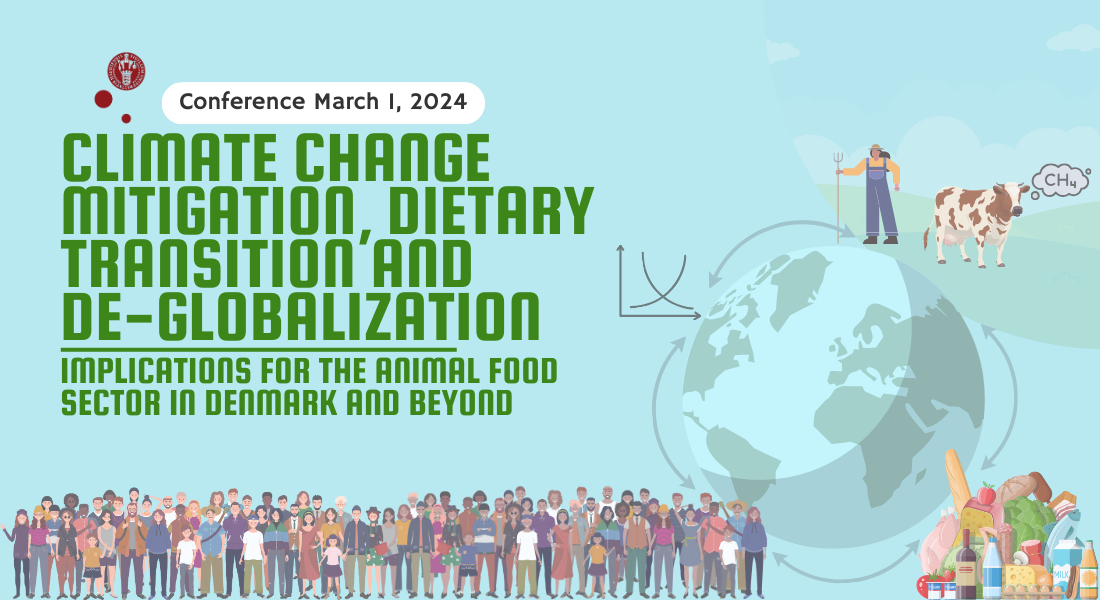
Climate change mitigation, dietary transition, and de-globalization:
Implications for the animal food sector in Denmark and beyond
The raging climate crisis and recent food price inflations have once again reminded the world of the challenges in mitigating agricultural GHG Emissions while maintaining food supply for a growing world population under dietary transition.
As the world recovers from the Covid-19 pandemic, disruptions to global food supply chains due to Russia’s invasion in Ukraine and reactive trade policy practices shed new light on the danger of fragmented and unstable global food markets.
Researchers at the University of Copenhagen have undertaken a major research project Animal Food Sectors’ Future: The triple challenges from income and demographic development, climate change and trade policy uncertainties to investigate how dietary transitions associated with changing income and demographics will increase global animal food demand at a time when decreasing livestock production is desired.
The Animal Food Sectors Future project has also examined the GHG abatement potentials and limits of available technologies in the livestock sector; and how uneven mitigation ambitions across countries can lead to inefficient allocations of mitigation burdens globally.
Furthermore, the project has looked into future globalization scenarios and how fragmented global food markets due to geopolitical tensions and nationalistic policies can hinder efficient tackling of common global challenges such as climate mitigation and food security.
This conference will highlight the main findings from the research project and include discussions and responses from invited experts, key stakeholders and high-level decision makers. The conference will be streamed live on Zoom, you can find the Zoom link below.
For further information, please contact Professor Wusheng Yu.
Program
09:20-9:50 Arrival, registration and coffee
09:50-10:00 Welcome and introduction (Wusheng Yu, Professor, University of Copenhagen)
10:00-10:55 Session 1: Future global demand for animal food (moderator: Wusheng Yu)
- Presentation of key project results
Jørgen Dejgård Jensen and Clara Garcia Bouyssou, University of Copenhagen
- Invited discussion
Jan Laustsen, Director, Trade & Markets, Danish Agricultural and Food Council
- Open discussion
11:10-12:10 Session 2: Impacts of global and national agricultural emission policies on animal production (moderator: Francesco Clora, Postdoctoral Researcher)
- Presentation of key project results
Wusheng Yu and Lærke Godsk Jensbye, University of Copenhagen
- Invited discussion
Ejnar Schultz, Vice President, Agricultural & Sustainability, Arla Foods
Michael Minter, Program Director, Food and Consumption, CONCITO
- Open discussion
12:10-13:30 Lunch and network break
13:30-14:25 Session 3: Globalization scenarios and future animal food markets (moderator: Henning Otte Hansen, Senior Advisor)
- Presentation of key results
Francesco Clora, University of Copenhagen
- Invited discussion
Martin Kristian Brauer, Director of Analysis & Statistics, Danish Agricultural and Food Council
Stine Hjarnø Jørgensen, Head of Agri & Food Jutland North & East, Nordea Business Bank
- Open discussion (10 minutes)
14:25-15:30 Session 4: Implications for society and policy (moderator: Bo Jellesmark Thorsen, Professor and Department Head, University of Copenhagen)
- Invited remark on EU green transition and global food security
Alan Matthews, Professor Emeritus of European Agricultural policy, Trinity College Dublin
- Invited remark from industry perspectives
Tim Ørting Jørgensen, Group Executive Vice President, Danish Crown
- Invited remark from political perspectives
Christian Friis Bach, Member of Danish Parliament
15:30-15:45 Wrap-up and good-bye
